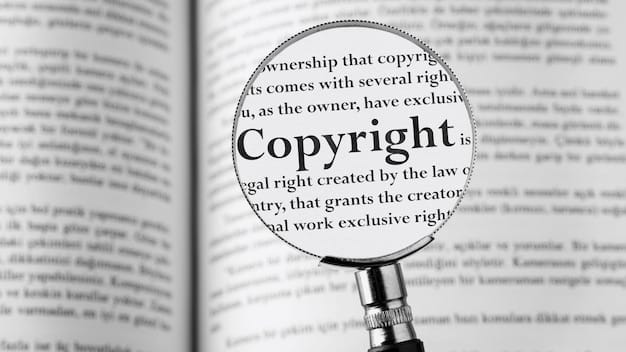Short Film Legal Guide: Copyright, Releases, & Insurance (2025)

Short Film Legal Considerations: Copyright, Releases, and Insurance Essentials for US Filmmakers in 2025 are crucial for protecting your creative work and mitigating potential legal issues. Understanding these aspects ensures your film can be screened and distributed without legal complications.
Creating a short film is an exciting endeavor, but navigating the legal landscape can feel daunting. Understanding the Short Film Legal Considerations: Copyright, Releases, and Insurance Essentials for US Filmmakers in 2025 is vital to protecting your work and avoiding potential pitfalls.
This guide will break down these key areas, providing you with the knowledge to confidently navigate the legal aspects of filmmaking and ensuring your short film is legally sound for distribution and screening. We’ll explore everything from copyright protection to securing necessary releases and obtaining adequate insurance.
Understanding Copyright for Your Short Film
Copyright is a cornerstone of filmmaking, protecting your original creative work from unauthorized use. This section will delve into the intricacies of copyright law as it applies to short films, ensuring your rights are safeguarded.
What Does Copyright Protect?
Copyright protects various elements of your short film, including the script, characters, music, and visual elements. Understanding what is protected helps you avoid infringement issues and secure your rights.
- Original screenplays and scripts
- Unique characters and their designs
- Original musical scores and compositions
- Cinematography, editing, and overall visual style
Registering Your Copyright
Although copyright protection exists from the moment a work is created, registering your copyright with the U.S. Copyright Office provides additional legal benefits. Registration allows you to sue for infringement and claim statutory damages and attorney’s fees. It strengthens your position and shows you understand short film legal considerations.

Copyright law protects your film, but it is still important to do your due diligence and register your work.
Essential Talent and Location Releases
Obtaining the correct releases is key to avoiding legal trouble and ensuring your short film can be shown. This section covers the different types of releases you need and how to get them correctly.
Talent Releases: Protecting Individuals Involved
Talent releases are agreements between you and the actors, extras, and anyone else appearing on camera. These releases grant you the right to use their likeness, voice, and performance in your film.
Securing talent releases is a critical part of Short Film Legal Considerations: Copyright, Releases, and Insurance Essentials for US Filmmakers in 2025. It ensures you have the legal right to use their image in your film.
Location Releases: Permissions to Film on Private Property
If you plan on filming on private property, you’ll need a location release from the property owner or manager. This release grants you permission to film on their property and use the footage in your short film.
- Clearly identify the location and the dates/times of filming.
- Specify the permitted use of the footage in your film.
- Include a clause releasing the property owner from liability.
Location releases can be simple and straightforward, but if you are filming at a very popular location, it may take some additional work to secure the right permits.
Navigating Music Copyright in Short Films
Using music in your film can add another dimension, but it’s vital to manage those copyright issues. This part details the music copyright rules for short films and how to get the necessary rights.
Public Domain Music: Free to Use
Music in the public domain is free for anyone to use without permission or payment. This typically includes music created before 1928. There are many websites with music and art in the public domain.
Licensing Music: Obtaining the Necessary Rights
If you want to use copyrighted music in your short film, you’ll need to obtain the appropriate licenses. There are two main types of licenses: synchronization licenses (for using the music in your film) and master use licenses (for using a specific recording of the music).
Securing the right to use music is an essential part of Short Film Legal Considerations: Copyright, Releases, and Insurance Essentials for US Filmmakers in 2025. You can find an artist that you like, and ask to pay for their music if it is not in the public domain.

Music can be a powerful tool that really enhances your short film, but music can also be a financial hurdle with legal ramifications.
Insurance Essentials for US Filmmakers
Having insurance is very important to protect yourself from costs if things go badly. This section goes over the must-have film insurance plans for filmmakers in the US.
General Liability Insurance
General liability insurance protects you from third-party claims of bodily injury or property damage. It’s crucial for covering incidents that may occur on set, such as someone tripping over equipment or damaging property.
There are many types of insurance, but general liability insurance protects both you and your partners, and is part of Short Film Legal Considerations: Copyright, Releases, and Insurance Essentials for US Filmmakers in 2025.
Workers’ Compensation Insurance
If you hire cast or crew members, you may be required to carry workers’ compensation insurance. This insurance covers medical expenses and lost wages for employees who are injured on the job.
- Check state laws regarding workers’ compensation requirements.
- Include volunteers as insured parties, if possible.
- Ensure coverage extends to all filming locations.
Workers Compensation insurance can protect those who are part of your staff from unforeseen issues that may leave them unable to work.
Future Proofing Your Short Film’s Legality for 2025
As we move closer to 2025, it’s important to look at Short Film Legal Considerations: Copyright, Releases, and Insurance Essentials for US Filmmakers in 2025 with an emphasis on what is coming.
Keeping up with changes in technology and the law will help you to successfully execute a successful and legal short film project. With changes happening every year, you need to constantly evolve and anticipate the changes.
Artificial Intelligence and Copyright
Since AI tools keep evolving, their impact on copyright law is constantly changing. If you are using AI tools you need to look at the changes and ensure that your project is meeting the copyright laws.
Digital Distribution Platforms’ Legal Terms
Distribution platforms often have specific legal terms and conditions that filmmakers must adhere to. By understanding these terms, you can ensure that your film complies with the platform’s requirements.
| Key Point | Brief Description |
|---|---|
| ©️ Register Copyright | Safeguard your creative work legally to avoid future issues. |
| 🎬 Secure Releases | Obtain talent and location releases for legal film screening. |
| 🎵 Music Licensing | License music or opt for Royalty Free music to avoid copyright pitfalls. |
| 🛡️ Obtain Insurance | Protect your film by obtaining insurance. |
Frequently Asked Questions
Key legal aspects include copyright protection, talent and location releases, music licensing, and adequate insurance coverage to protect against liabilities and ensure smooth production and distribution.
Talent releases are essential for legally using actors’ likeness and performances in your film. Without these, you risk potential lawsuits from talent claiming unauthorized use of their image.
General liability insurance protects against third-party claims, while workers’ compensation covers on-set injuries to cast/crew. These insurance types provide essential financial protection for filmmakers.
To legally use copyrighted music you’ll need both a synchronization license (to use the song in your film) and a master use license (to use a specific recording of the song).
Legal advice should be sought, as the state could be in flux. You should carefully review terms of service, get licenses and clarify ownership of AI generated material.
Conclusion
Understanding Short Film Legal Considerations: Copyright, Releases, and Insurance Essentials for US Filmmakers in 2025 can help you protect your project and also allow you to grow as a filmmaker. It is a part of the craft, and not something to be avoided.
By taking proper legal steps you will have more freedom and legal security. Securing the necessary rights, music, talent, locations, following the law, and getting proper insurance, can help prepare you for 2025 and beyond.





